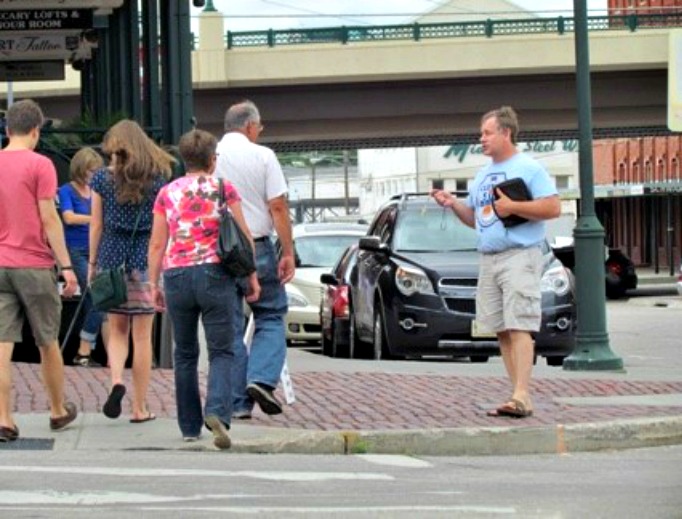Cornhusker for Christ: Making the Catholic Case in Downtown Lincoln
Nebraska lawyer Bob Sullivan witnesses to his faith via a unique rosary-centered street ministry.

Nebraska fans who walk through downtown Lincoln to catch Cornhusker home football games on Saturdays will almost inevitably pass by a little stand near the Haymarket Farmer’s Market with colorful rosaries and pamphlets of Catholic literature.
Bob Sullivan, 49, a trial attorney from Hastings, stands by, ready to hand out a rosary or a book and to talk with anyone who seems open to discussing and learning more about the Catholic faith.
“When the Huskers are playing, people are less likely to talk to us. They may take what we’re offering, but they don’t want to get into conversations because they have beer to drink, they have family to meet, or they’re off to do something else,” said Sullivan, who is one of several Catholic street evangelists who work to spread the faith throughout Lincoln.
In a recent interview with the Register, Sullivan, who is married and is the father of five daughters, discussed how he got into street evangelization and the interactions he has with Catholics and non-Catholic Christians on the street, as well as the immense value he sees the Rosary having for evangelization.
How long have you been involved with active evangelization?
The actual street evangelization and handing out of rosaries, I’ve been doing that for about four to six years now. Prior to that, I engaged in a lot of social-media apologetics and evangelization. I saw there was so much vitriol online. When I got into some local groups that were being very critical of the Church, I thought, “You know what? I bet you guys aren’t such jerks face-to-face. Let’s set up a meeting at the coffee shop in Lincoln. Y’all can come down, and we’ll just chat.” I got a pretty good turnout for that, and it turned out they weren’t as bad when they actually had to look me in the face and talk about reality. That was a lot of fun, and it turned out to be a pretty fruitful thing. I probably had about six or seven of those meetings over the course of about a year.
How did the street evangelization start?
A buddy who I didn’t know at the time had seen something from St. Paul Street Evangelists about starting a street evangelization group, and I had already been looking into them for about a year and thought that would be a really cool thing to do. When a mutual friend put us two together, I said, “Hey, I’ll help with it, even though I live 100 miles from Lincoln. I’d love to engage people on the street if possible.” So we started that, and that has led into this rosary thing.
Why the rosary?
The rosary was an unexpected tool of evangelization. I just didn’t think too many people would be open to picking up a rosary from somebody, but it opens up conversations and gives us some great opportunities to talk about Scripture and the faith. We hand out all colors of rosaries, and they really seem to catch people’s eye. We had one guy on a cellphone the last time we were out there telling someone, “Yeah, they got cross necklaces here.” We were like, “Hey, call it whatever you want, pal. We’ll teach you.”
Where did your interest in evangelization come from?
I went through 12 years of Catholic education as a kid. I always had a great loyalty and trust in the Catholic faith, but I didn’t really know why the Church taught a lot of what it teaches. So when I got into my mid-30s, I started doing some research online, looking up why we believed Mary was assumed body and soul into heaven. Was there anything scriptural that supports that? Is there anything historical that supports that? I started with Mary because to me that was the most difficult thing to explain to others about our faith. A lot of people who are considering Catholicism or are critical of Catholicism are somewhat skeptical about Marian devotion. But when I started looking into it, I learned, “Wow, there are a lot of reasons for this.” There are historical reasons, there is logic, and there is Scripture. It just really increased my own confidence in my faith, and it put that trust and loyalty into a desire to share it with other people.
How did you prepare for street evangelization?
After about two to three years of working with friends and acquaintances, I realized I was a little heavy on the catechesis and apologetics aspect, and I was very light on the spiritual aspect. So I backed off for a while and started reading some of the doctors of the Church regarding spirituality like St. John of the Cross, St. Teresa of Avila, St. Ignatius, and then I reintroduced myself back into apologetics online and found that my approach had totally changed from one where I was being the attorney and proving the case regardless of the expense. I think it helped me to be much more charitable in the way I approach people.
Do you still engage in online apologetics?
For the last 10 years, I’ve continued the online stuff. The other day, I got into a lengthy conversation with some very angry people about the legalization of marijuana. One of the guys at the end of the day said, “Gosh, I’ve never seen anyone get insulted so often on Facebook and not react to it.” It doesn’t really bother me. I’d rather have the conversation than stroke my own ego.
And that has led to this more public approach. Because what I really love to do is talk to people, eye-to-eye, face-to-face, and really engage them, maybe develop a bit of a relationship with them. That’s what getting out on the streets of Lincoln and going to some of the events we go to has really helped me to do. It’s so much fun that I guarantee I probably get no grace from it because I think all my reward is here on Earth.
How often do you do street evangelization?
During the summer, I’m out in Lincoln once or twice a month. We start in May. We could do Saturday mornings at the farmers market, which gives us a very diverse crowd of people. The last thing they probably expected to be talking about that morning was God. Then we go right into the beginning of Nebraska football season, and that’s when we start engaging the fans who come to Lincoln for the games.
Where do you set up?
The ordinances in Lincoln do not allow us to have a booth or table set up, so what I built was kind of an A-frame that’s more like a stand-up sign where we’re able to pin our rosaries to that, as well as our medals, pamphlets and booklets. That is what really attracts people. We don’t sit out there, flag people down and say, “Hey, are you saved?” They primarily come to us because they see what we have and they’re curious. The colorful rosaries attract them, and we’re just ready to talk if they want to talk.
How do those interactions tend to go?
There are about a dozen of us in Lincoln who do this, and everybody has their own style and comfort level. With me, typically, because of my training in law, I might use the Socratic method with people, where I ask them, ‘Are you Catholic?’ And if they say, “Yes,” I’ll ask, “Where is your parish?” That tells me if they are an engaged Catholic or not, because if I know the parish then I can say, “Who is your pastor?” And if they don’t know who the pastor is, then that tells me, “Oh, they probably need a Matthew Kelly book.”
We’ve had a lot of lapsed or lukewarm Catholics walk away telling us, “I’m coming back. I need to take this more seriously.” Occasionally, we’ll get some pretty emotional experiences when someone has an epiphany that they have been away and do need to take this more seriously.

How would you describe the responses to your questions?
The vast majority of them have very poor responses, very similar to what we as Catholics will say when asked, “Why are we Catholic?” “Oh, because my husband or wife is Catholic,” or “I was raised Catholic.” A lot of us can’t explain why we are the faith we are. Now, I’ve had some people come up with very good responses, and typically those are people who are in ministry already and have kind of done this on their own, but the vast majority is just blindsided by that question.
For how long are you out on the street evangelizing?
We typically set up at 9am and try to wrap it up around noon. It’s different on game days because people are usually too busy to talk to us. That’s what makes the summertime so productive for us because people are typically not in a hurry. We catch them off-guard and they’ll later say, “Wow, this is kind of an interesting thing to talk about.” If I’m down there evangelizing for three hours, I might have three conversations that are about 10-15 minutes long in that time.
Have you had any rewarding experiences in this work?
I’ve had a number of people come back to me that I met a year or six months ago, and they’ll say, “Hey, I’ve been thinking about this,” or “I read what you gave me,” and they want to talk about it more. It’s a pretty cool experience to have these people come back, sometimes up to a year later.
Register correspondent Brian Fraga writes from Fall River, Massachusetts.
- Keywords:
- brian fraga
- new evangelization
















